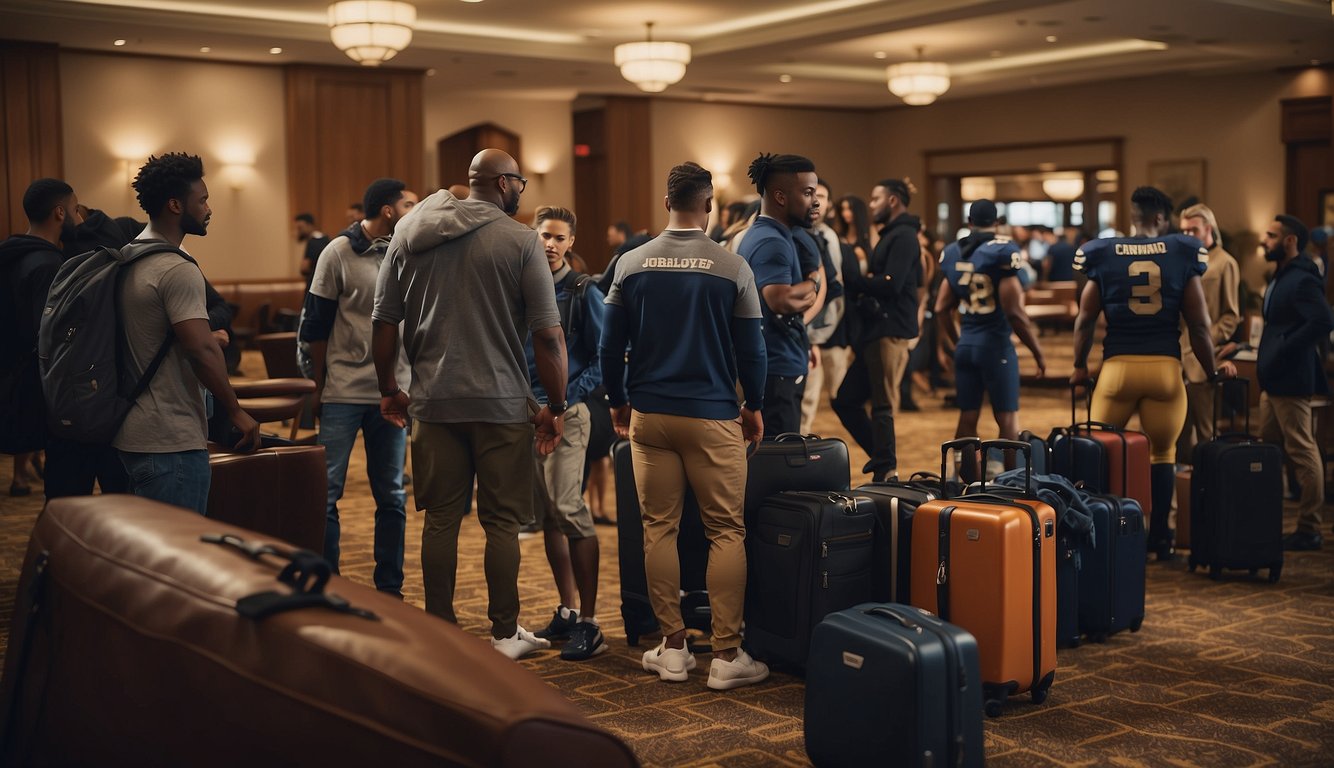Where Do College Football Teams Stay on the Road?

For college football teams, away games are not just about the competition on the field but also entail a complex orchestration of travel and lodging logistics. From departure to game day, every detail is meticulously arranged to keep the team’s focus razor-sharp on victory.
Related Post! How Many Players Do College Football Teams Travel With?
Where Do College Football Teams Stay on the Road?
When on the road, college football players typically stay in hotels that have been pre-arranged by their team’s logistics staff. These accommodations are chosen for their ability to meet the specific needs of a sports team, including space for meetings, meals, and secure equipment storage.
The journey typically kicks off with a chartered flight or a bus convoy, transitioning into a seamless check-in at carefully selected hotels that cater to the unique needs of a sports team.
Securing the right hotel is paramount, with a preference for establishments that offer spacious areas for team meetings, nutritious dining options, and ample room for equipment storage. These hotels become more than just a place to sleep; they’re a hub for strategic preparations and recovery, ensuring the team remains synchronized and primed for the upcoming challenge.
Essential Insights:
- Travel and lodging plans prioritize the team’s ability to maintain focus and prepare for game day.
- Ideal accommodations provide specialized amenities that cater to the collective and individual needs of the team.
- On-site preparations at the hotel play a pivotal role in fostering a unified team dynamic and ensuring strategic alignment.
Behind-the-Scenes: Mastering Away Game Logistics

The orchestration of away games involves a comprehensive approach to travel coordination and accommodation planning, ensuring every aspect contributes to the team’s performance.
Navigating Travel Logistics:
- Chartered Flights: Preferred for longer distances, ensuring the team travels together with ease.
- Bus Convoys: Utilized for closer venues, offering a practical solution for transporting players and equipment.
Related Post! How Do College Football Players Travel?
Accommodation Strategy:
- Strategic Hotel Bookings: Proximity to the game venue is key, along with ensuring the hotel can accommodate the team’s comprehensive needs.
- Dedicated Team Floors: Hotels often allocate entire floors to the team, facilitating secure and focused environments for meetings and strategy sessions.
Ensuring Security and Privacy:
- Law Enforcement Escorts: To ensure safe and timely transit to the stadium, local police often provide motorcade assistance.
- Private Security Detail: Additional security measures may be employed to guarantee the team’s safety and privacy throughout their stay.
Related Post! How Are College Football Schedules Determined?
Choosing the Right Base Camp: Hotel Selection for Peak Performance
The choice of hotel is integral to the team’s readiness, with a focus on facilities that support both physical preparation and strategic planning.

Hotel Selection Essentials:
- Location Matters: Hotels in close vicinity to the stadium are preferred to reduce travel time on game day.
- Tailored to Team Needs: Essential amenities include meeting spaces for tactical discussions and services that cater to athletes’ health and well-being.
Amenities for Athletic Excellence:
- Customized Catering: Meals designed to meet the nutritional requirements of athletes.
- Recovery Resources: Access to pools and spas for physical recovery post-competition.
Rooming for Success:
- Cohesive Player Accommodations: Keeping players on dedicated floors to enhance team solidarity.
- Support Staff Proximity: Ensuring coaches and support staff are readily available for any needs that arise.
In essence, the logistical planning for away games in college football is a critical component of a team’s success strategy, encompassing everything from travel arrangements to the nuanced selection of accommodations, all designed to keep the team competitive and focused on the ultimate goal: victory on game day.
Related Post! Do College Football Players REALLY Have To Attend Classes?
On-Site Preparations
For college football teams, the strategy for away games encompasses much more than just on-field tactics. It involves comprehensive planning to ensure every aspect of the trip contributes to optimal performance come game day.
Strategizing in Team Meetings
Key to our readiness are the team meetings, where strategies are refined and team unity is reinforced. These sessions are held in:
- Private Conference Rooms: Reserved in advance to guarantee a focused environment.
- Pre-Game Schedule: Typically convened on the eve of the match to cement game plans and review opponent strategies.
Managing Gear with Precision
The meticulous handling of equipment is essential, with every item accounted for to avoid game-day hiccups. The process involves:
- Coordinated Logistics: For the secure transport of gear to and from the venue.
- Thorough Inventory Checks: Ensuring all equipment is accounted for pre-and post-game.
Collaboration with the hotel staff is vital to secure a storage space that’s both accessible and secure.
Game Day Dynamics
The day of the game is a carefully choreographed routine designed to peak team performance:

Pre-Game Regimen
- Final Briefings: A last review of strategies and player roles.
- Mental Conditioning: Visualization techniques and mental rehearsals of plays.
- Physical Warm-Up: Light exercises to prepare the body for the game.
Seamless Transit
- Scheduled Departures: Buses leave well ahead of time to account for any unforeseen delays.
- Optimal Arrival: Timed to ensure players are game-ready without undue waiting.
Focusing on Health and Nutrition
Nutrition takes center stage on the road, with meal plans designed to fuel peak performance and recovery.
Catered Nutritional Support
- Quality Catering Partners: Working with caterers who understand the nutritional needs of athletes, ensuring meals are both nourishing and palatable.
- Diverse Dietary Options: Accommodating various dietary needs to keep every player at their best.
Strategic Meal Timing
- Balanced Meals: Emphasizing carbohydrates for energy and proteins for muscle recovery, with hydration as a constant priority.
- Timed Nutrition: Aligning meal times with the game schedule to ensure players are energized but not weighed down.
This holistic approach to away games—from strategic meetings and equipment management to nutrition and game day routines—ensures that the team remains focused, cohesive, and ready to compete at the highest level, regardless of the location.
